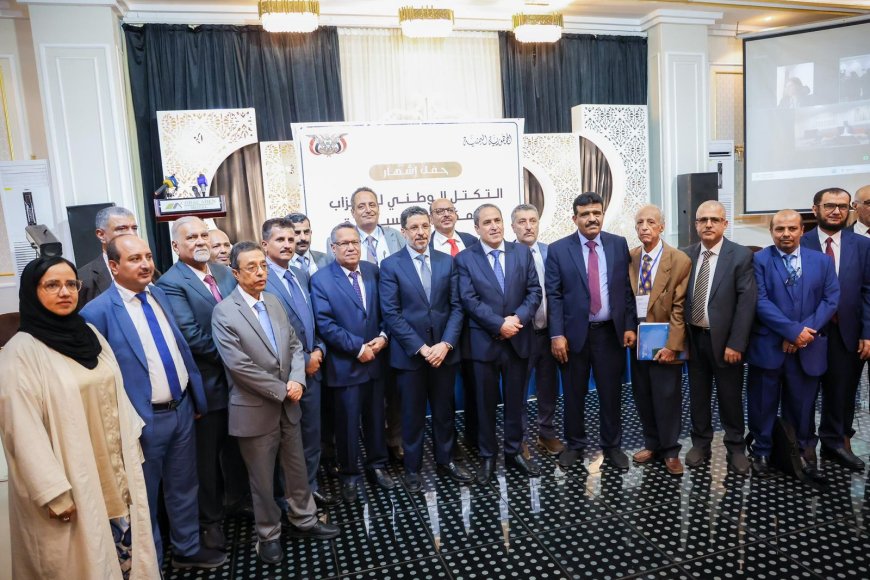Shibhaljazeera | Local News | Yemen
Today in Aden, the “National Bloc of Political Parties and Entities” was announced with the primary objective of countering Sanaa forces, under the supervision and support of the United States, amid objections and reservations from the Southern Transitional Council (STC).
According to the founding statement signed by 21 political parties and groups, the organizational charter was approved, and it was decided that the bloc’s leadership in its first term would be held by the General People’s Congress, appointing Dr. Ahmed Obaid Bin Daghr as the head of the bloc’s supreme council for this term.
The bloc’s political agenda aims to “restore the state and unify national forces to counter the rebellion and end the coup,” as the statement put it, explicitly referencing the fight against Sanaa forces. It also calls for “solving the Southern issue as a key matter” by establishing a special framework for it within the final political solution, maintaining the republican system within a federal state that fulfills the aspirations of all provinces, and “preserving the sovereignty, independence, and territorial integrity of the republic” as well as unifying state authority and extending its influence across all national territories with “the return of all state institutions to function from the temporary capital, Aden.”
The statement emphasized that the bloc’s primary purpose is “to enhance national unity to end the Houthi militia coup and restore the state,” adding that it is “not directed against any political partners,” underscoring that the bloc’s primary aim is to confront Sanaa forces.
The bloc includes several political parties and entities, including the “General People’s Congress, Yemeni Congregation for Reform (Islah), Yemeni Socialist Party, Nasserist Popular Unity Organization, Political Office of the National Resistance, Participating Southern Movement, Union of Yemeni Rashad, Justice and Development Party, Southern National Coalition, Nahdha Movement for Peaceful Change, National Solidarity Party, Southern Revolutionary Movement, Yemeni Unification Movement, Union of Popular Forces, Peace and Development Party, Arab Socialist Ba’ath Party, Hadhramaut National Council, People’s Democratic Party (Hashd), Shabwa National Council, Republican Party, and Liberation Front Party,” with the statement noting that other political forces are welcome to join.
These parties had convened several times in recent months to establish this bloc, with support from the “National Democratic Institute” and “USAID,” part of U.S. efforts to rally local groups against Sanaa forces and pressure them to stop their attacks against Israel and U.S.- and UK-linked vessels. These efforts began late last year but encountered obstacles with Saudi Arabia and the UAE declining direct participation out of concern for retaliation from Sanaa forces.
In late April, the official “Saba” news agency reported that these parties had agreed to form the bloc with the objective of “advancing the process of ending the coup,” referencing opposition to Sanaa forces.
However, the Southern Transitional Council, a member of the Presidential Leadership Council and government, announced its reservations regarding joining the bloc. STC spokesperson Salem Thabet Al-Awlaki wrote in a post on the platform “X” (formerly Twitter), as noted by Shibhaljazeera on Monday evening, that “the Southern Transitional Council has observed the activity of this bloc being established by some parties and affirms that it will not participate in the bloc or its activities, with the STC to formally clarify its stance on the bloc’s outcomes.”
Supporters of the STC criticized the bloc, describing it as disregarding the South’s demands—an indirect reference to the STC’s push for secession.
The Presidential Leadership Council and Yemeni government have repeatedly called for U.S. and international support to take military action against Sanaa forces, capitalizing on the U.S. and Western desire, alongside Israel, to apply military pressure on the Houthis to halt their support for Gaza. However, this move requires regional backing that Saudi Arabia, the UAE, and Egypt have refrained from providing despite repeated U.S. requests, fearing a response from Sanaa forces, according to a recent report by The Washington Post.
